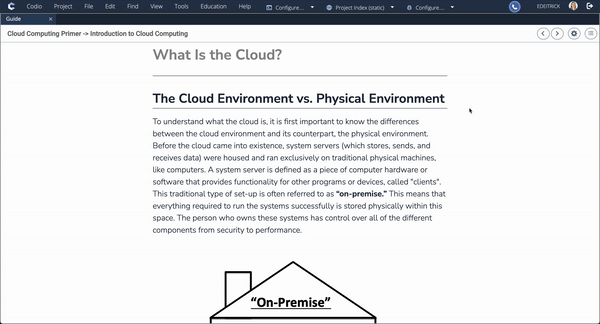
Constructing Knowledge Through Coding
Cloud Computing for Business emphasizes the importance of students applying and exploring the information presented. With Codio’s interactive interface, a code editor accompanies each page. This way, students can actively see how the computer responds to code, rather than simply showing the end result. In addition, the course content provides code snippets that allow students to become familiar with the language, as well as suggested avenues for investigation.
Auto-Graded Assessments
Students receive immediate, rich feedback about their Cloud Computing skills. In addition to correctness feedback (i.e. right or wrong), students will also see an explanation with the complete solution when learning about Cloud Computing for Business.
There are a wide variety of questions, all of which are auto-graded, giving students a sense of their understanding of the Cloud Computing for Business course material right after they are introduced to it and as they attempt harder and harder problems.
Lowering the Barrier to Entry
The Cloud Computing for Business course reflects the need for computing education to meet students where they are. Like any specialized community, computing has its own jargon. The formal teaching of computing should not burden students with the assumption that they are fluent in this special language.
The material is presented in smaller units that are more manageable for the students. The same vocabulary and cloud computing concepts are covered, but in a more approachable way. Our Cloud Computing for Business course states information as plainly as possible, and, when appropriate, use images, tables, or lists.
Another way in which this content is more approachable is that it uses interactive demos to allow students hands-on exploration of the theoretical concepts introduced.
Encouraging Customization Through Modularity
This content is not a one-size-fits-all solution. Instead, it implements a modular format. Natural break points occur in the curriculum where instructors can make the changes they deem necessary. Instructors can re-name, re-order, or remove units.
Using Codio’s excellent content authoring tools, they can author new material. This modular approach gives instructors flexibility when designing the learner’s experience.